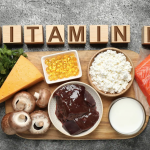Five benefits of vitamin D by Dr. Jade Malay

Introduction
Dr. Jade Malay says Vitamin D is the sunshine vitamin—it’s made by our bodies from sunlight. It helps us absorb calcium to keep bones strong and healthy, and it also plays a role in muscle strength, mood, weight management and more. Most people don’t get enough vitamin D from food or sunlight, which can lead to health problems like bone loss and heart disease. Luckily for those of us who feel a little deficient in this critical nutrient, there are plenty of ways to boost your levels: from taking supplements to eating more foods high in vitamin D (like salmon) or spending more time outside under safe sun exposure conditions.
Vitamin D can help you feel happier.
Dr. Jade Malay says Vitamin D is a hormone, so it affects your brain. It can make you feel happier and help prevent depression. It can also help reduce anxiety and stress, which can contribute to poor sleep quality.
Vitamin D can help you sleep better.
Vitamin D helps regulate the sleep-wake cycle. It’s important for healthy sleep, and can help you sleep better by helping you fall asleep faster, stay asleep longer, and wake up more refreshed.

Vitamin D can help protect your bones.
Vitamin D is important for bone growth and helps with the absorption of calcium. In fact, vitamin D deficiency can cause osteomalacia, which means "soft bones." A lack of vitamin D can also increase your risk of fractures, or breaking a bone.
In addition to helping you protect your bones from osteoporosis (a disease that causes weak, brittle bones), a recent study found that people who took vitamin D supplements had less inflammation in their bodies than those who didn't take the supplements. This could explain why previous studies have shown an association between low levels of vitamin D and higher levels of chronic pain as well as depression.
Vitamin D can keep your heart healthy.
Vitamin D can help lower blood pressure.
It may also protect against heart disease, heart failure and stroke.
Vitamin D may also help lower blood sugar levels in people with diabetes.
Vitamin D can reduce the risk of kidney disease in those at high risk for it (such as those with type 1 or 2 diabetes), but there's no evidence that it prevents kidney stones or other diseases of the kidneys.
Vitamin D can boost your immune system.
Vitamin D is known to help boost the immune system, which means it may help prevent colds and other respiratory infections. It can also help prevent certain cancers, heart disease, type 1 diabetes, and more.
A study published by the American Journal of Epidemiology found that people with higher levels of vitamin D had a lower risk of dying from cancer over a 10-year period than those with lower levels. A separate study published in the European Journal of Cancer Prevention found that men who had high blood levels of 25-hydroxyvitamin D (the form of vitamin D stored in your liver) were 30% less likely to develop prostate cancer than those who had low levels.
If you have low vitamin D levels, try supplements and spend more time in the sun safely.
-
Vitamin D is important for your health. The right amount of vitamin D can help protect you from cancer, diabetes and heart disease.
-
How much vitamin D do you need? If you're not already taking a supplement, the National Institutes of Health recommends that adults ages 19 to 70 get 600 international units (IU) each day. For people older than 70, this number jumps up to 800 IU per day. The current recommended daily intake is around 4,000 IU; however many experts think this may be too high and could lead to adverse health effects such as calcification in organs like the kidneys or several types of cancer including prostate cancer if taken for long periods of time.* If you want more natural sources for getting more vitamin D into your diet, try eating salmon or other fish high in omega 3 fatty acids because they contain vitamin B12 which helps absorb calcium better.* If these methods aren't working well enough then start taking supplements containing vitamin A so they can help promote certain enzymes responsible for breaking down fats faster* Finally make sure that when spending time outdoors during daylight hours to make sure there are no clouds covering any part of sky - clouds block out UV rays which are necessary
Conclusion
If you haven’t already, it’s time to start taking vitamin D supplements. You don’t need to take a lot—just 1,000 IU per day is enough to raise your blood levels by 25%. The best part? There are no known side effects from taking vitamin D supplements. If you don't like the idea of swallowing pills every day, try eating more fatty fish such as tuna or salmon (which contain about 300 IU per 3 ounces) or mushrooms (100 IU per cup). And if all else fails, just spend a little more time outside in the sun each day!































